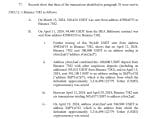Last updated:
 Why Trust Cryptonews
Why Trust Cryptonews

South Korea’s Financial Services Commission (FSC) pledged on September 20 to actively support the second phase of crypto legislation.
According to a recent report by Digital Today, FSC officials emphasized the need for a level playing field as the virtual asset industry increasingly intersects with traditional finance, focusing on business activity regulations and real-name accounts for corporations and institutions.
South Korea Targets Global Regulation Standards
The new legislation addresses regulatory challenges related to security tokens and central bank digital currencies (CBDCs) while ensuring global compatibility and robust investor protection.
The initiative to implement the second phase of crypto legislation follows recent discussions highlighting the urgency of adapting regulatory frameworks.
Authorities are considering revising the Capital Market Act to include clearer guidelines on digital assets.
One key aspect under consideration is issuing real-name accounts for corporations and institutions.
This move is expected to improve transparency and accountability, providing a legal foundation for corporate participation in the virtual asset market, predominantly dominated by individual investors.
In addition, the FSC has indicated that the new regulations will cover the operation and qualification requirements for virtual asset service providers.
This includes stricter standards for anti-money laundering (AML) and know-your-customer (KYC) procedures.
The Commission expressed the need for collaboration with global regulatory bodies to ensure that South Korea’s approach to digital asset regulation is in sync with evolving global standards, reducing the risk of regulatory arbitrage and fostering a safer environment for investors.
$107 Million Seized During Last Year
South Korea’s Joint Virtual Asset Investigation Team has seized $107 million in assets from suspects involved in crypto-related fraud over the past year.
Since its launch, the unit, based in the Seoul Southern District Prosecutors’ Office, has indicted 41 individuals and arrested 18.
The unit, including officials from the Financial Supervisory Service, the Korea Exchange, and the National Tax Service, has handled high-profile cases involving luxury assets such as supercars and properties in affluent areas like Gangnam.




